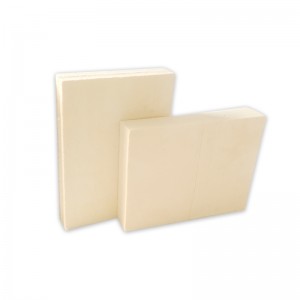 Phenolic foam is a kind of high performance material which is more suitable for use in harsh environmental conditions, and has a good development prospect. Other buildings that require fire and insulation requirements, such as steel structure factories, large industrial factories, activity rooms, cold storage rooms, clean workshops, building floors, temporary buildings, sports halls, supermarkets, etc. It is precisely because the most prominent advantage of phenolic insulation board is fire prevention and insulation.
Phenolic foam is a kind of high performance material which is more suitable for use in harsh environmental conditions, and has a good development prospect. Other buildings that require fire and insulation requirements, such as steel structure factories, large industrial factories, activity rooms, cold storage rooms, clean workshops, building floors, temporary buildings, sports halls, supermarkets, etc. It is precisely because the most prominent advantage of phenolic insulation board is fire prevention and insulation.
At the same time of producing phenolic foam fire insulation board, the company also produces assembly line production equipment for the insulation board. Modified phenolic internal and external wall insulation board is a patented synthetic material developed by our factory’s researchers. This product achieves the effects of external wall insulation and internal wall veneer in one go. It is a very economical, safe, efficient, and energy-saving wall internal and external insulation system.
Application of phenolic foam in building energy conservation
In recent years, phenolic foam has been applied to some major projects and civil buildings, and the demand is increasing year by year. With the improvement of the national energy saving requirements for buildings and other projects and the issuance of corresponding fire prevention regulations, the use of some traditional thermal insulation foams will be limited, and phenolic foam will be widely developed.
Phenolic foam insulation has excellent fireproof performance, low price, safety and light weight, so its application prospect in the construction industry is very attractive. Can be used for wall insulation, non heating basement upper floor insulation, insulated ceilings, various types of house ceilings and partitions, etc. According to the characteristics of phenolic foam, wet bonding, leaving air layer and covering can be adopted: phenolic foam board and wall are bonded with inorganic binder with high strength and good water resistance; The cover adopts gypsum materials with high strength, small shrinkage, and high softening coefficient.
Phenolic foam is also the most promising new thermal insulation material among the internationally recognized buildings. Because this new material is fundamentally different from the materials obtained by adding flame retardants to ordinary polymer resins. It does not burn, melt, or emit toxic smoke in fire, and has advantages such as lightweight, non-toxic, corrosion-free, thermal insulation, energy saving, sound insulation, and low cost. It does not require Freon foaming, has no environmental pollution, good processability, and is easy to construct. Its comprehensive performance is unmatched by various insulation materials at present.
The uniqueness of phenolic board
Phenolic color steel plate combines the dual advantages of traditional materials and modern science and technology, which not only enhances the insulation performance of the board, but also improves the compressive strength and insulation performance of the product, making it an ultra high-quality fireproof and insulation material. At the same time, it also has the characteristics of waterproof, non-toxic, non deformable, non combustible, high strength, and long service life. The performance characteristics of color steel composite phenolic insulation board: good insulation, which can greatly reduce heat dissipation loss; Excellent bending strength and compressive strength; Having good sound insulation effect; Lightweight, can reduce building load, and is easy to install; Beautiful and elegant, durable. Suitable for central air conditioning duct systems of various public facilities such as hotels, office buildings, and high-rise commercial buildings, as well as various insulation pipelines and building exterior and roof insulation industries. If used in factories, mines, and mechanical equipment with strict fire protection requirements, its non combustible, low smoke, and high-temperature resistance to deformation can be more prominent. For example, insulation of ships, warships, trains, armored vehicles, as well as papermaking, chemicals, pharmaceuticals, and other aspects.
Phenolic fire-resistant insulation board has:
1. Excellent fire resistance: Organic insulation materials such as polyurethane and polystyrene can produce thick smoke and highly toxic substances after combustion, which can easily cause death and increase the difficulty of firefighting. The phenolic insulation board is incombustible in case of fire, with the combustion performance up to Class A, the maximum use temperature of 180 (250 ℃ instantaneous is allowed), and the flame resistance of 100mm thick phenolic foam can be more than 1 hour without being penetrated. Under the direct action of the flame, there is carbon deposition, no dripping, no curling and no melting. After the flame burns, a layer of “graphite foam” is formed on the surface, which effectively protects the foam structure in the layer
2. Excellent thermal insulation performance: The thermal conductivity is less than 0.025, more than twice that of polystyrene, similar to polyurethane, making it an excellent material for thermal insulation and insulation;
3. Corrosion resistance and aging resistance: It can resist almost all inorganic acids, organic acids and organic solvents. Long term exposure to sunlight without obvious aging phenomenon, thus possessing good aging resistance;
4. Low density and light weight: The density of phenolic insulation board is below 100 kg/m3, which can reach around 50 kg/m3. It can reduce the self weight of buildings, reduce the load on buildings, reduce structural costs, and construction is simple and fast, which can improve work efficiency;
5. Sound absorption performance: phenolic insulation board has excellent sound absorption performance, and the perforated foam structure is more conducive to sound absorption;
6. Environmental protection: Rock wool and glass wool are harmful to the environment and people. When polyurethane and polystyrene are burned and heated, they will decompose into highly toxic gases such as hydrogen cyanide and carbon monoxide. And the phenolic insulation board adopts fluorine free foaming technology, which is fiber free and meets national and international environmental protection requirements.
Post time: Oct-25-2023
